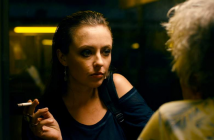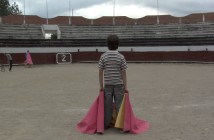Tru Love (2013)
Cast: Shauna MacDonald, Kate Trotter, Christine Horne
Director: Kate Johnston, Shauna MacDonald
Country: Canada
Genre: Drama | Romance
Official Site: Here
Editor’s Notes: The following review is apart of our coverage for Inside Out Toronto: LGBT Film Festival which runs from May 22nd to June 1st. For more information on visit http://www.insideout.ca/ and follow Inside Out on Twitter at @InsideOutTO.
My queer sensibilities have encountered a range of LGBT films, from the standard “coming out” narratives to the normalized queer experiences. It is the latter category that I love, primarily because it turns sexuality into a character trait rather than a narrative catalyst. This isn’t to say that films about coming out/coming to terms with one’s sexuality are inherently bad, but their formulaic plots have become tired and clichéd. A film like Kate Johnston and Shauna MacDonald’s Tru Love follows this same recycled trajectory: it is an admirable attempt to craft a story about female sexuality, but the handling of the material (and the material itself) isn’t that original.
…an admirable attempt to craft a story about female sexuality, but the handling of the material (and the material itself) isn’t that original.
Tru (Shauna MacDonald) is a thirtysomething year old whose endless flings with women come to an abrupt stop when she meets Alice (Kate Trotter), a widow who is trying to pick up the pieces of her fabricated life. The two women form an unexpected bond, but Suzanne (Christine Horne), Alice’s daughter and Tru’s one-night stand, tries to stop the budding relationship. The cinematography creates an intimate space for the relationship, which is juxtaposed against the cold harsh winter (I believe this is an intentional metaphor). The images are quite striking (especially those of the two women on beach chairs in winter), although I can’t completely understand the point of beginning the film with images of shattered glass imposed onto waves on the beach. Kate Trotter is exquisite as Alice. She plays her role with such nuance and subtlety, creating a woman who is literally haunted by the image of her repressed past (in this case, she talks to her dead husband) and is slowly becoming comfortable with her own skin. It is a remarkable character arc that is both realistic and heartbreaking.
The film is about recouping lost time, making up for missed opportunities, and in living in the moment.
The rest of the film evolves like a generic rom-com, but one that has taken a decidedly serious turn. You can tell that the directors have earnest intentions in depicting the May-December romance of Tru and Alice, but their efforts come off as a rehash of other queer films. The character of Tru, in particular, is severely underdeveloped. Although she has some great moments, her evolution isn’t as powerful as that of Alice, primarily because Tru never truly explores the emotional obstacles that hinder her from creating long-lasting relationships. Her backstory is filled emotional problems that should be addressed (especially her relationship to her deceased parents), but the filmmakers wrap up her storyline more out of narrative necessity rather than out of the character’s need to change. The resolution (although it differentiates from the romanticized “Hollywood Ending”) loses much of its power because Tru only superficially overcomes her problems.
The film is about recouping lost time, making up for missed opportunities, and in living in the moment. Tru Love is a pleasurable experience that will please a majority of audiences, but it is not the radical experience that creates a necessity for these types of stories. It has that distinct trait of “otherness” that pervades “coming out” films, and it relies too heavily on overused conventions of rom-coms. Tru Love could have been a more powerful film, especially because sexuality is a powerful tool, but the film fails to reach such great heights.
Tru Love creates a wonderful character who is exploring her untapped sexuality, but that is not enough to overcome its formulaic plot and major flaws.




